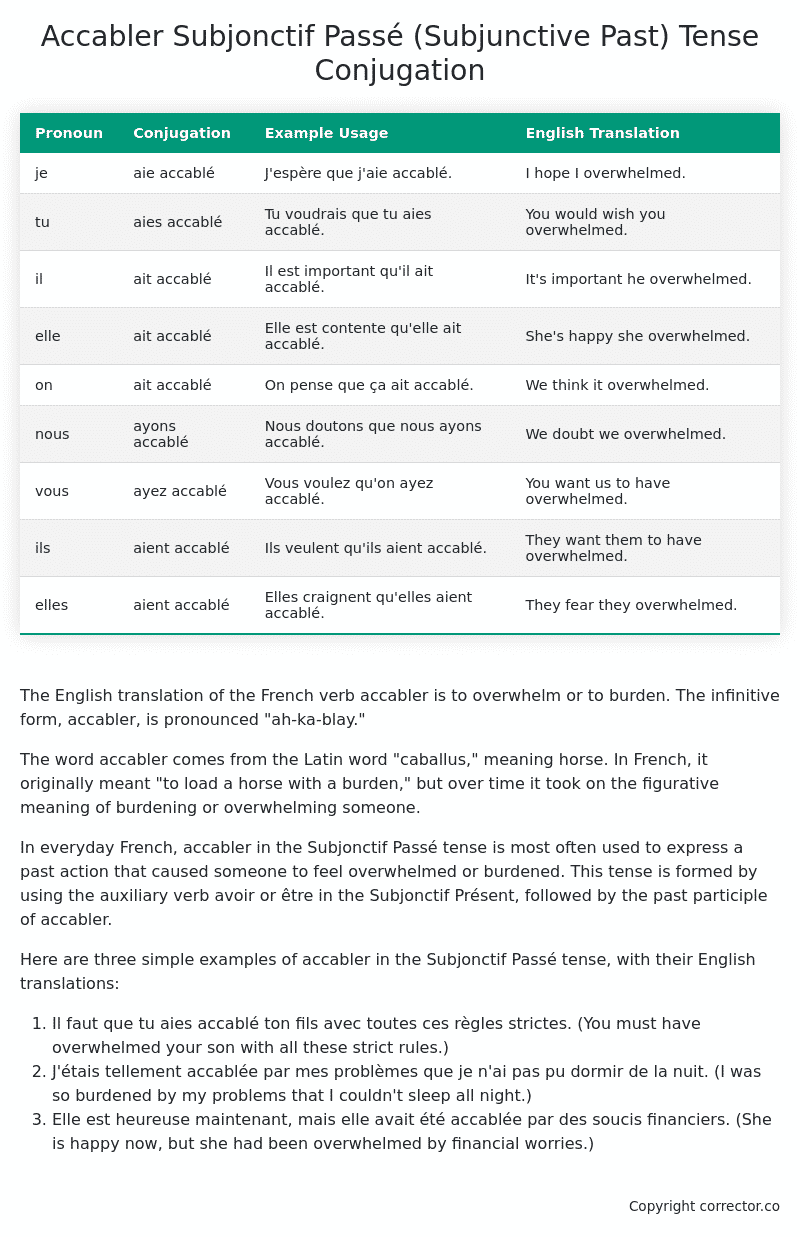Subjonctif Passé (Subjunctive Past) Tense Conjugation of the French Verb accabler
Introduction to the verb accabler
The English translation of the French verb accabler is to overwhelm or to burden. The infinitive form, accabler, is pronounced “ah-ka-blay.”
The word accabler comes from the Latin word “caballus,” meaning horse. In French, it originally meant “to load a horse with a burden,” but over time it took on the figurative meaning of burdening or overwhelming someone.
In everyday French, accabler in the Subjonctif Passé tense is most often used to express a past action that caused someone to feel overwhelmed or burdened. This tense is formed by using the auxiliary verb avoir or être in the Subjonctif Présent, followed by the past participle of accabler.
Here are three simple examples of accabler in the Subjonctif Passé tense, with their English translations:
- Il faut que tu aies accablé ton fils avec toutes ces règles strictes. (You must have overwhelmed your son with all these strict rules.)
- J’étais tellement accablée par mes problèmes que je n’ai pas pu dormir de la nuit. (I was so burdened by my problems that I couldn’t sleep all night.)
- Elle est heureuse maintenant, mais elle avait été accablée par des soucis financiers. (She is happy now, but she had been overwhelmed by financial worries.)
Table of the Subjonctif Passé (Subjunctive Past) Tense Conjugation of accabler
| Pronoun | Conjugation | Example Usage | English Translation |
|---|---|---|---|
| je | aie accablé | J’espère que j’aie accablé. | I hope I overwhelmed. |
| tu | aies accablé | Tu voudrais que tu aies accablé. | You would wish you overwhelmed. |
| il | ait accablé | Il est important qu’il ait accablé. | It’s important he overwhelmed. |
| elle | ait accablé | Elle est contente qu’elle ait accablé. | She’s happy she overwhelmed. |
| on | ait accablé | On pense que ça ait accablé. | We think it overwhelmed. |
| nous | ayons accablé | Nous doutons que nous ayons accablé. | We doubt we overwhelmed. |
| vous | ayez accablé | Vous voulez qu’on ayez accablé. | You want us to have overwhelmed. |
| ils | aient accablé | Ils veulent qu’ils aient accablé. | They want them to have overwhelmed. |
| elles | aient accablé | Elles craignent qu’elles aient accablé. | They fear they overwhelmed. |
Other Conjugations for Accabler.
Le Present (Present Tense) Conjugation of the French Verb accabler
Imparfait (Imperfect) Tense Conjugation of the French Verb accabler
Passé Simple (Simple Past) Tense Conjugation of the French Verb accabler
Passé Composé (Present Perfect) Tense Conjugation of the French Verb accabler
Futur Simple (Simple Future) Tense Conjugation of the French Verb accabler
Futur Proche (Near Future) Tense Conjugation of the French Verb accabler
Plus-que-parfait (Pluperfect) Tense Conjugation of the French Verb accabler
Passé Antérieur (Past Anterior) Tense Conjugation of the French Verb accabler
Futur Antérieur (Future Anterior) Tense Conjugation of the French Verb accabler
Subjonctif Présent (Subjunctive Present) Tense Conjugation of the French Verb accabler
Subjonctif Passé (Subjunctive Past) Tense Conjugation of the French Verb accabler (this article)
Subjonctif Imparfait (Subjunctive Imperfect) Tense Conjugation of the French Verb accabler
Subjonctif Plus-que-parfait (Subjunctive Pluperfect) Tense Conjugation of the French Verb accabler
Conditionnel Présent (Conditional Present) Tense Conjugation of the French Verb accabler
Conditionnel Passé (Conditional Past) Tense Conjugation of the French Verb accabler
L’impératif Présent (Imperative Present) Tense Conjugation of the French Verb accabler
L’infinitif Présent (Infinitive Present) Tense Conjugation of the French Verb accabler
Struggling with French verbs or the language in general? Why not use our free French Grammar Checker – no registration required!
Get a FREE Download Study Sheet of this Conjugation 🔥
Simply right click the image below, click “save image” and get your free reference for the accabler Subjonctif Passé tense conjugation!

Accabler – About the French Subjonctif Passé (Subjunctive Past) Tense
Formation of the Subjonctif Passé
Everyday Usage Patterns
Interactions with Other Tenses
Present tense
Future tense
Conditional
Summary
I hope you enjoyed this article on the verb accabler. Still in a learning mood? Check out another TOTALLY random French verb conjugation!


